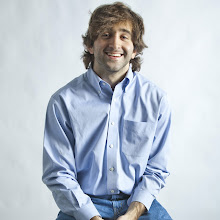As I’ve mentioned in earlier blog posts, one of the more recent highlights of being a student at New York University has been a Friday afternoon interview series at a local Barnes & Noble between Dr. David Schroeder, NYU’s Director of Jazz Studies, and various jazz legends.
He’s interviewed many musicians who I admire and can relate to in some way, but for the most part, the stories of those being interviewed are very different than my story, and they are life stories that, given the time and place of my birth, are absolutely impossible to have happened to me. While that is also so with the story of the great pianist Monty Alexander – who Dr. Schroeder interviewed this past Friday - there was something about his story, what initially drew him to the music, and what continues to inspire him today that struck a deep chord with me.
While many of the jazz greats that I’ve heard speak live often talk of how their lives changed drastically from the minute they heard John Coltrane (something I can’t relate to), Alexander said that one of his first powerful musical memories was the contagious smile and happiness he felt when listening to Nat King Cole sing.
There was something I could relate to.
He went on and on; speaking about pianists Erroll Garner and Nat Cole (noting how Nat is certainly one of the most underrated pianists of all time, as his influence on great pianists such as Ahmad Jamal is extremely evident, which is something I’ve been thinking about for a while now). However, more than anything he could’ve said about their musical technique, he spoke about the way in which they performed, and how it impressed him so. He said that Nat would sit at the piano and play, but he’d have his legs facing toward to the audience; really playing for them.
He spoke of the joy he felt when he listened to Erroll Garner, and Milt Buckner, and Eddie Heywood.
“Did he just say Eddie Heywood?!” I had to do a double take! One of my favorite pianists of all, Heywood was a truly beautiful player, a master of touch and taste, and also one of the great masters of playing melodies.
As Alexander went on to talk about what he loved about Heywood’s playing, (“His playing was perfectly economical,” he said.) I began to feel like I was listening to myself talk. I sat in awe listening to how the exact same musicians had affected each of us in the exact same way at the exact same time in our lives.
I loved how he would say often that the things he most loved about certain musicians was that they made him feel good, or that simply, they made him smile.
Often, musicians, when asked the same question, go on about one’s technical mastery of the instrument, or things very specific, musically, that they admire. To me, it’s always been about making me smile and feeling good on the inside. It was truly a thrill to hear this simple, truthful answer come from this master. In some ways, it made me feel that my ideas and thoughts, similar to his, were finally validated.
He went on to explain that he wasn't attracted to the dissonances created by the music of John Coltrane and Ornette Coleman and more free jazz (although he loved to listen to it and was in awe of it!...He just didn't want to play it). His musical goal has always been to honor the melody and play with and around the melody in the most beautiful way possible. Another sigh of relief.
It was very validating to hear Monty Alexander express my feelings towards music as his. To hear these things, things that have often made me feel more isolated than closer to my peers, was exciting to hear because it made me realize that, "Hey! There are people thinking like me!" Plus, he's been thinking this way since the 1950's and it's worked pretty well for him, too!
Besides this extremely validating and inspiring insight into the thought process of Monty Alexander, he, too, like his heroes Nat Cole, Louis Armstrong, and Erroll Garner, is a fantastic entertainer. The stories he told left the audience jaw-dropped in amazement.
He spoke of a gig one night, where he was playing solo piano, and there sitting in front of him at a table were Frank Sinatra and Miles Davis, deep in discussion.
He spoke of hanging out with Miles at his house. He said that Miles constantly listened to Sinatra, especially when learning a ballad. "Miles played Sinatra around the house," Alexander said. "I was there."
He spoke of Jimmy Smith and Richard "Groove" Holmes, and the hardships of lugging around big organs. He said that both organists bought old Hearst cars and drove to every gig with the organ in the back.
He also mentioned a conversation he had had with bassist Bob Cranshaw just after Cranshaw recorded the now legendary Lee Morgan tune, "The Sidewinder." He said that during the session Morgan was trying to get pianist Barry Harris to play the classic bluesy figure that makes up the melody, and Harris refused. "I won't play it," he said. "That's Rock N' Roll!"
It was a truly exciting and inspiring hour, and I feel honored to have been present.
Wednesday, May 25, 2011
Subscribe to:
Post Comments (Atom)




No comments:
Post a Comment